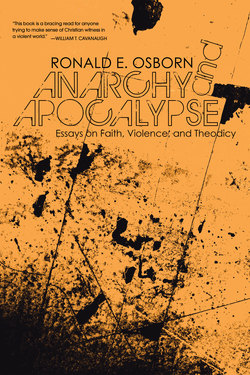Читать книгу Anarchy and Apocalypse - Ronald E. Osborn - Страница 3
На сайте Литреса книга снята с продажи.
Preface
ОглавлениеThe essays and articles in this volume (with the exception of the final chapter) were written as responses to the terrorist attacks of September 11, 2001, and America’s subsequent wars in Afghanistan and Iraq. These events, however, are only occasionally directly mentioned. My feeling from the start of the so-called “war on terror” was that what concerned people around the world—and religious persons in the United States in particular—most needed were tools of dissent based upon a longer view of history. I therefore tried in my writing to practice a kind of critical detachment from the grim revelations of the daily news cycle, not by affecting a spurious and pseudo-scientific “objectivity” but by searching primarily for analogies, memories, and allusions as a way of resisting the “principalities and powers” in Washington, London, Baghdad, and elsewhere. Hence, for example, as the bombs began to fall on Kabul in 2002 I decided to follow Simone Weil’s lead at the start of World War II and begin by writing about Achilles, Hector, and the fall of Troy in Homer’s Iliad. Whether or not this was the right approach I leave to my readers to decide. I hope, though, that by their nature the chapters that follow might provide helpful ways of thinking not only about the violence and suffering of the past eight years (continuing into the present), but more broadly about the violence and suffering of humanity at war with itself from the beginning of history as we know it.
I have arranged these essays according to themes and arguments rather than in a strictly chronological order. They vary greatly in style, length, and approach. All, though, focus on closely related questions. What are the underlying causes and consequences of violence? What kinds of moral and spiritual resources can persons of belief—and especially those of us in the Christian tradition—draw on in the face of dilemmas of injustice, inequality, and conflict? How should we respond to the clamorous calls for obedience and allegiance assailing us from all directions? And what existential and moral crises must individuals of all faiths, or none, face up to in the age of Auschwitz, Hiroshima, My Lai, Rwanda, and Abu Ghraib?
If there is an underlying “project” in these essays it is an attempt to make clear the vibrant connections between nonviolent anarchist and Christian political thought as found in the Gospel narrative. I first began seriously thinking about the anarchist dimensions of the Christian euangelion while helping to coordinate emergency food and shelter relief for returning refugees with an international aid organization in Kosovo in the six months immediately after the end of the 1999 war. It was my first job out of college. Before leaving for the Balkans I had packed two books into my suitcase: The Kingdom of God is Within You by Leo Tolstoy and The Chomsky Reader by Noam Chomsky. Reading Tolstoy and Chomsky against a backdrop of destroyed Albanian villages set me thinking in earnest for the first time about the intractable moral and political problems generated not only by violence and war but by power itself, and to begin to reexamine nonviolence (I had already read a fair amount of Martin Luther King Jr. and Gandhi as an undergraduate) as a serious response to the many paradoxes, ironies, ambiguities, and temptations of power.
I later discovered thinkers like Jacques Ellul, John Yoder, Vernard Eller, William Cavanaugh, and Stanley Hauerwas, all of whom advocate some form of what might be described as Christian nonconformity with power if not Christian anarchism. But my interest in Chomsky in particular (who I have written about elsewhere1) grew out of my sense that, like the early pioneers of the Seventh-day Adventist church—the peculiar denomination in which I was raised and which continues to be animated by a distinctive apocalyptic imagination—he was engaged in a form of social and political critique that was not merely political but in fact prophetic. Hence the title of this collection, which reflects my own complex, highly personal, and ongoing attempt to work out the political implications of authentic (as opposed to apologetic or fundamentalist) apocalyptic and prophetic faith in a world of ferocious “beasts” ready to wage war with every imaginable tooth and claw—savage structural adjustment policies, “enhanced interrogation techniques,” secret “renditions,” “precision” bombing, massive military-industrial complexes supported by both major parties, and insurgency and counter-insurgency warfare.
There are many people to whom I owe gratitude for making this book possible. First and foremost, I want to thank my parents, Ken and Ivanette, my two sisters, Lorelie and Kim, and my grandparents, Robert and Evelyn Osborn. This book is dedicated to the memory of my grandfather, who was a conscientious objector and noncombatant medic during World War II. Sigve Tonstad generously read and commented on an early draft of this manuscript, for which I am grateful. I would also like to acknowledge some friends and mentors who have played particularly important roles in shaping and sharpening my ideas (not always by their agreement) over the course of my life: Roy Branson, Eric Guttschuss, Harry Leonard, Douglas Morgan, and Ottilie Stafford. Finally, I must thank the editors of the Adventist Peace Fellowship, Spectrum Magazine, Humanitas, the Journal of Law and Religion, First Things, and Z Magazine, which published earlier versions of some of these essays and have kindly permitted me to reprint them.
—2010
1. Osborn, “Noam Chomsky and the Realist Tradition,” 351–70.
